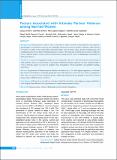Please use this identifier to cite or link to this item:
https://hdl.handle.net/20.500.14356/2302| Title: | Factors Associated with Intimate Partner Violence among Married Women |
| Authors: | Ghimire, Sailaja Ghimire, Sushmita Sagtani, Reshu Agrawal Upadhyay, Shambhu Kumar |
| Citation: | GhimireS., GhimireS., Agrawal SagtaniR., & UpadhyayS. K. (2023). Factors Associated with Intimate Partner Violence among Married Women. Journal of Nepal Health Research Council, 20(4), 928-934. https://doi.org/10.33314/jnhrc.v20i4.4318 |
| Issue Date: | 2022 |
| Publisher: | Government of Nepal; Nepal Health Research Council; Ramshah Path, Kathmandu, Nepal |
| Keywords: | Intimate partner violence Kathmandu Mixed method Triangulation |
| Series/Report no.: | Oct-Dec, 2022;4318 |
| Abstract: | Abstract Background: Intimate partner violence refers to any behavior within an intimate relationship that causes physical, psychological or sexual harm to those in the relationship. Various factors such as alcohol or substance abuse, history of violence in family, extra marital affair, educational status, socio-economic status, decision making power, and established gender role are linked with Intimate partner violence. This study aims to identify the prevalence of different forms of intimate partner violence and its associated factors among married women in Shankharapur municipality of Kathmandu District. Methods: A concurrent triangulation design was used. Quantitative data were collected from 602 married females while qualitative data was collected from 11 participants. Multivariate logistic regression was done using Stata MP13 version. Thematic analysis was done for qualitative data. Triangulation of both quantitative and qualitative findings waere done. Results: The prevalence of Intimate partner violence was found to be 22.1%. After logistic regression, it was found that women’s involvement in community groups had lower odds (AOR 0.67, 95%CI 0.6-0.7) of IPV as compared to those who were not involved in community groups. Additionally, findings from the qualitative study showed female being victims of different forms of violence. Conclusions: Still, Female are the sufferers of violence behind the closed doors and mitigation strategies should have to be adopted from different levels of government to control intimate partner violence. Keywords: Intimate partner violence; Kathmandu; mixed method; triangulation. |
| Description: | Original Article |
| URI: | https://hdl.handle.net/20.500.14356/2302 |
| ISSN: | Print ISSN: 1727-5482; Online ISSN: 1999-6217 |
| Appears in Collections: | Vol 20 No 04 Issue 57 Oct-Dec, 2022 |
Files in This Item:
| File | Description | Size | Format | |
|---|---|---|---|---|
| 4318-Manuscript-32173-1-10-20230720.pdf | Fulltext | 268.18 kB | Adobe PDF |  View/Open |
Items in DSpace are protected by copyright, with all rights reserved, unless otherwise indicated.
